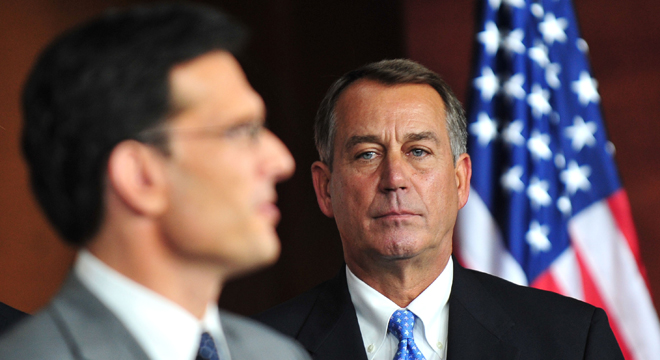Long, long ago – well, on Friday night to be exact – it looked like a two month extension of the expiring payroll tax cut was on a glide path to passage in both the House and Senate — preventing an automatic tax increase on 160 million workers on January 1 and giving Republicans and Democrats until the end of February to negotiate an extension through the end of 2012.
But as soon as the deal was announced, House GOP aides privately speculated that the deal wouldn’t fly with the majority of their caucus despite buy in from Speaker John Boehner, Senate GOP leader Mitch McConnell, all of his deputies and the vast majority of Senate Republicans.
Sure enough, they were right. The deal collapsed in spectacular fashion early Saturday. After passing the Senate with an overwhelming majority, Boehner presented the deal to his members, many of whom — including Boehner’s top lieutenants — rejected it. Sunday morning, he appeared on NBC to declare it dead on arrival.
The rebellion is a striking rebuke by House conservatives of the party’s leadership. And it throws into doubt whether Congress will be able to renew the payroll tax cut, extended unemployment benefits, and Medicare physician reimbursements in the next two weeks.
Boehner’s members don’t want to replay this fight in two months — during the height of primary season, when President Obama’s in campaign mode. But that leaves them making several arguments that don’t really pass the smell test: that the Senate payroll tax bill, which was drafted by McConnell and Harry Reid, and received 89 votes, including from such noteworthy liberals as – er – Marco Rubio — is actually a Democratic bill; that the House’s highly partisan bill, which extends the payroll cut for a full year, is an equally viable alternative; and that after a year of operating the government by brinkmanship, and resolving standoffs behind closed doors, that the appropriate way forward now is for party leaders to “conference” the House’s partisan bill with the Senate’s consensus package.
Despite the implicit slap in the face by House Republicans, McConnell seems to have accepted their demands.
“The House and Senate have both passed bipartisan bills to require the President to finally make a decision on the Keystone XL jobs, and to extend additional unemployment insurance, the temporary payroll tax cut and seniors’ access to medical care,” his spokesman Don Stewart emailed me in a statement Sunday. “The House and the President both want a full-year extension. The best way to resolve the difference between the two-month extension and the full-year bill, and provide certainty for job creators, employees and the long-term unemployed, is through regular order, as the Speaker suggested.”
That wasn’t Reid’s understanding. Boehner had deputized McConnell to cut a deal that would get bipartisan support in both chambers, and is implicitly threatening to present Boehner the Senate passed bill as a take-it-or-leave-it proposition.
“When we met last week, Speaker Boehner requested that Senator McConnell and I work out a compromise. Neither side got everything they wanted, but we forged a middle ground that passed the Senate by an overwhelming bipartisan majority,” Reid said in a Sunday statement. “If Speaker Boehner refuses to vote on the bipartisan compromise that passed the Senate with 89 votes, Republicans will be forcing a thousand-dollar tax increase on middle class families on January 1st.”
If he sticks to his guns, that leaves Boehner over a barrel. If the Senate bill remains the only viable legislation, Boehner will have to alienate the majority of his caucus and his leadership team to pass it, or the GOP will face severe political backlash when the tax cut expires. There are still 14 days between now and then. But with an 89-vote bill in his back pocket, Reid has a very viable argument that the Senate package should stand, or be amended on very Democratic-friendly terms. If that’s the path Reid takes, it will be the make-or-break moment for Boehner’s speakership that everyone expected all year.










